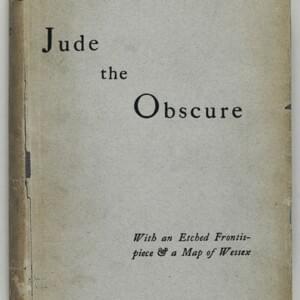
Jude the Obscure (Chap. 5.4) Thomas Hardy
На этой странице вы найдете полный текст песни "Jude the Obscure (Chap. 5.4)" от Thomas Hardy. Lyrxo предлагает вам самый полный и точный текст этой композиции без лишних отвлекающих факторов. Узнайте все куплеты и припев, чтобы лучше понять любимую песню и насладиться ею в полной мере. Идеально для фанатов и всех, кто ценит качественную музыку.

Their next and second attempt thereat was more deliberately made, though it was begun on the morning following the singular child's arrival at their home.
Him they found to be in the habit of sitting silent, his quaint and weird face set, and his eyes resting on things they did not see in the substantial world.
“His face is like the tragic mask of Melpomene,” said Sue. “What is your name, dear? Did you tell us?”
“Little Father Time is what they always called me. It is a nickname; because I look so aged, they say.”
“And you talk so, too,” said Sue tenderly. “It is strange, Jude, that these preternaturally old boys almost always come from new countries. But what were you christened?”
“I never was.”
“Why was that?”
“Because, if I died in damnation, 'twould save the expense of a Christian funeral.”
“Oh—your name is not Jude, then?” said his father with some disappointment.
The boy shook his head. “Never heerd on it.”
“Of course not,” said Sue quickly; “since she was hating you all the time!”
“We'll have him christened,” said Jude; and privately to Sue: “The day we are married.” Yet the advent of the child disturbed him.
Their position lent them shyness, and having an impression that a marriage at a superintendent registrar's office was more private than an ecclesiastical one, they decided to avoid a church this time. Both Sue and Jude together went to the office of the district to give notice: they had become such companions that they could hardly do anything of importance except in each other's company.
Him they found to be in the habit of sitting silent, his quaint and weird face set, and his eyes resting on things they did not see in the substantial world.
“His face is like the tragic mask of Melpomene,” said Sue. “What is your name, dear? Did you tell us?”
“Little Father Time is what they always called me. It is a nickname; because I look so aged, they say.”
“And you talk so, too,” said Sue tenderly. “It is strange, Jude, that these preternaturally old boys almost always come from new countries. But what were you christened?”
“I never was.”
“Why was that?”
“Because, if I died in damnation, 'twould save the expense of a Christian funeral.”
“Oh—your name is not Jude, then?” said his father with some disappointment.
The boy shook his head. “Never heerd on it.”
“Of course not,” said Sue quickly; “since she was hating you all the time!”
“We'll have him christened,” said Jude; and privately to Sue: “The day we are married.” Yet the advent of the child disturbed him.
Their position lent them shyness, and having an impression that a marriage at a superintendent registrar's office was more private than an ecclesiastical one, they decided to avoid a church this time. Both Sue and Jude together went to the office of the district to give notice: they had become such companions that they could hardly do anything of importance except in each other's company.
Комментарии (0)
Минимальная длина комментария — 50 символов.












